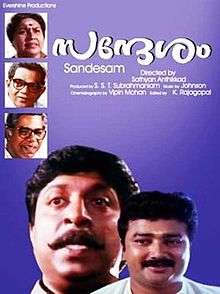Sandhesam
| Sandhesam | |
|---|---|
 Poster | |
| Directed by | Sathyan Anthikkad |
| Produced by | S. S. T. Subrahmaniam |
| Written by | Sreenivasan |
| Starring |
Sreenivasan Jayaram Thilakan Siddique Kaviyoor Ponnamma Maathu Biyon |
| Music by | Johnson |
| Cinematography | Vipin Mohan |
| Edited by | K. Rajagopal |
Production company |
Evershine Productions |
| Distributed by | Evershine Release |
Release dates |
|
| Country | India |
| Language | Malayalam |
Sandhesam (English: Message) is a 1991 Indian Malayalam black comedy-political satire film written by Sreenivasan and directed by Sathyan Anthikkad, starring Sreenivasan, Jayaram, Thilakan, Siddique, Kaviyoor Ponnamma and Maathu. The film deals with unreal political activism existing in Kerala and takes major digs on the political parties in the state.
A commercial success upon release, Sandesham is often regarded as a classic in Malayalam cinema.[1] The film was included in IBN Live's list of "100 Greatest Indian Films of All Time".[2][3][4] The film was remade in Tamil language as Veettai Paar Naattai Paar by director Thulasidas in 1994.
Plot
After his retirement from Indian Railways, as station master, Raghavan Nair (Thilakan) is back at his home. His long cherished dream to spend his retired life along with his family consisting of his wife (Kaviyoor Ponnamma), three sons and two daughters gets a blow after seeing his two sons brawling each other over their political differences. Prabhakaran (Sreenivasan), the elder one is a staunch leftist, and an active worker of the Revolutionary Democratic Party (RDP), which has just lost the Kerala state Assembly elections and relinquished office. Prakashan (Jayaram), popularly known as KRP, his younger brother is involved with the Indian National Secular Party (INSP), which has now come to power. Though they are both educated, neither has any plans to earn a living on their own and are fully immersed in petty politics, sponging off their parents for their needs.
Raghavan Nair becomes deeply worried about their future, and tries to advise his sons, but of his admonitions fall on deaf ears. Anandan (Mala Aravindan), his son-in-law is a police sub-inspector but is now on suspension. When the RDP was in power, he arrested and beat up several of the opposition party workers on instruction from the ruling party officials. Now that the previous opposition is in power, they exact their revenge, first by transferring him repeatedly to stations as far away from civilisation as is possible, and then by suspending him.
As part of his retired life, Raghavan Nair decides to focus his attention on his agricultural activities and meets the new young agricultural officer (Siddique) and, with his wife's approval, wants their younger daughter to get married to him, but his elder sons oppose it on flimsy and petty reasons. Prakashan, whose party is in power, pulls strings and get him transferred immediately to a remote location in order to prevent the marriage, but Nair gets them married at the registrar's office.
In the meantime, Anandan and his wife, Raghavan Nair's eldest daughter, demand partition of the property and their share, which Raghavan Nair objects to. The last straw is when their mother falls ill and is hospitalised for a day or so, and none of her children bother to show up at the hospital - in particular, the two older sons. Raghavan Nair, when he sees all of them milling around his house on returning from the hospital, loses his temper. He throws out all his children and orders them never to enter his house again. But to his surprise he finds both Prakasan and Prabhakaran at the gate, fully repented. He calls them in and they begin a new life. The film ends by showing Prabhakaran going to court as a lawyer and Prakashan for a job interview.
Cast
- Sreenivasan as Prabhakaran Kottappalli
- Jayaram as Prakasan Kottappalli
- Thilakan as Raghavan Nair (Father of Prabhakaran and Prakasan)
- Kaviyoor Ponnamma as Bhanumathi (Wife of Raghavan Nair and Mother of Prabhakaran and Prakasan)
- Maathu as Lathika (Raghavan Nair's younger daughter)
- Oduvil Unnikrishnan as Achuthan Nair (Friend of Raghavan Nair)
- Siddique as Udayabhanu (Lathika's husband and Raghavan Nair's son-in-law)
- Mala Aravindan as Anandan, SI of Police
- K. P. A. C. Lalitha as Anandan's wife and Raghavan Nair's Eldest Daughter
- Mamukkoya as K.G. Pothuval
- Sankaradi as Kumarapillai the leftist idealogist
- Innocent as Yashwant Sahai
- Bobby Kottarakkara as Uthaman
- Biyon as S.I Anandan's Son
- T. P. Madhavan as Police Inspector
- Master Rahul Laxman as Prasanthan (Raghavan Nair's youngest son)
- James
References
- ↑ Cris Seetha (20 June 2011). "What happens next?". Deccan Chronicle. Kochi, India. Retrieved 7 July 2011.
- ↑ "100 Years of Indian Cinema: The 100 greatest Indian films of all time". IBN Live. 26 April 2013. Retrieved 24 May 2013.
- ↑ "'Mayabazar' is India's greatest film ever: IBNLive poll". IBN Live. 12 May 2013. Retrieved 24 May 2013.
- ↑ "IBNLive Poll: Vote for India's greatest film of all time". IBN Live. 26 April 2013. Retrieved 24 May 2013.
External links
- Sandhesam at the Internet Movie Database
- Sandhesam at the Malayalam Movie Database